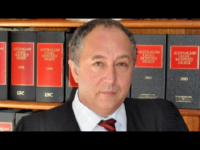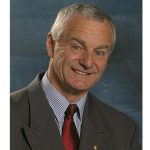Drug Driving Laws Are “a Great Wrong”: An Interview With Former Magistrate David Heilpern

David Heilpern is something of a legend in the NSW Northern Rivers. The former Lismore magistrate is known throughout the region for the just decisions he handed down in relation to residents who’d been caught out by the unjust laws that govern the NSW roadside drug testing regime.
The Northern Rivers region has long been a flashpoint of NSW police roadside drug testing operations, even before the Baird government announced in December 2015 that the state was tripling the amount of tests being conducted annually to 97,000.
Indeed, these days, the quota the police force must fill is 200,000 tests a year.
The reason why roadside drug testing in NSW is so derided is unlike random breath testing for alcohol, drug driving laws maintain that if a person is driving with any amount of a substance in their system – even minute traces – they’ve committed a crime.
This means drivers are testing positive for four select drugs – cannabis, amphetamines, MDMA and cocaine – when they’re not actually impaired. Drivers are having their licence disqualified and receiving steep fines when they’re not driving under the influence or posing any road harm.
Smoked over a week ago
With the Northern Rivers region having long been targeted by the NSW police roadside drug testing regime, the list at Lismore courthouse has been overwhelmed with case after case involving residents, who much of the time have complained that they were booked unjustly.
In 2016, then Magistrate Heilpern remarked that he’d presided over numerous cases where people were claiming that they’d tested positive because cannabis had been consumed “by passive smoking, eating hemp seeds, rubbing hemp balm or taking medicinal cannabis tincture”.
And the former Lismore magistrate delivered the landmark Carrall decision on 1 February that year. This saw him find Joseph Carrall not guilty of drug driving following a positive test for cannabis, as it was shown that the Northern Rivers local had last smoked cannabis nine days prior to testing.
Carrall explained that he was certain he hadn’t smoked for at least a week, as he’d based his decision to wait that long before driving on the advice of senior constable Chayne Foster, who conducted the test.
The same police officer had told Carrall a month earlier to wait a week before driving after consuming cannabis, as the defendant had just tested positive on the side of the road for driving with the substance in his system.
Leaving the bench
But, gone are the days of looking forward to seeing Magistrate Heilpern sitting at the bench in the Lismore Courthouse, when you turn up charged with cannabis driving, after having sat beside your terminally ill friend, who’d been smoking the plant medicinally.
Heilpern has just retired, and the Byron Bay local makes clear that a large part of his decision to do so was the impact drug driving laws were having upon his work. The ex-judicial officer first raised the gavel back in 1991, after a long and distinguished career in criminal law.
Sydney Criminal Lawyers spoke to former Magistrate Heilpern about his aim to speak out against these unfair laws, the reasoning behind the landmark Carrall decision and the detrimental effects these laws are having in northern NSW.
Firstly, over your time as a Lismore magistrate you saw the effects of NSW roadside drug testing laws firsthand. Implemented in 2007, these laws have long been criticised for the flawed premise they’re based up.
Mr Heilpern, how would you describe the way drug driving laws operate in NSW?
Completely nonsensical. It just doesn’t make any sense to be taking people off the road, who are not ill-affected by whatever substance they’re consuming.
We don’t take people off the road who are consuming prescription drugs, unless they’re affected. We don’t take people off the road for drinking, unless they’re affected.
And nor should we be taking people off the road for using drugs – be they licit or illicit, prescription or non-prescription – unless what they’re doing is an increased risk to the community.
The second reason they’re nonsensical is because there has been no associated reduction in the road toll.
When they introduced random breath testing, there was a massive reduction in the road toll. When they introduced compulsory seatbelts there as a reduction in the road toll.
Now here we have 200,000 tests in NSW this calendar year. There will be thousands and thousands of people taken off the road. And yet, there is no provable benefit to the community from these laws.
I would say, they’re a huge detriment to the community.
NSW authorities have had an increased focus on testing drivers for drugs on the side of the road since late 2015. How would you say it’s impacted the Northern Rivers community?
It’s had a really significant effect on the Northern Rivers community. Firstly, there are a significant number of people who have lost their licences as a result of this.
And secondly, for those who use cannabis medicinally – and there are a significant number of them, not only on the north coast, but throughout the country – they’re unable to drive.
Many of them lose their independence. They lose their ability to get from A to B to medical appointments and the like.
In February 2016, you ruled Joseph Carrall was not guilty in relation to a cannabis driving charge, as you found that he hadn’t smoked any cannabis for nine days prior to testing positive.
How did you come to that conclusion? And with the way that the laws are drafted in this state, wasn’t he still technically guilty?
No. He wasn’t technically still guilty, as people are innocent until proven guilty. And he was never found guilty.
Also, there was no appeal for the position in Carrall – in other words, that decision stands.
The same point – the defence of honest and reasonable mistake of fact – is available. It has been accepted in other courts, including the District Court in NSW.
But, in terms of the case of Carrall itself, once the defence of honest and reasonable mistake of fact is properly raised, and that evidential burden has been sustained, then the burden shifts, and the prosecution must disprove the defence beyond a reasonable doubt.
So, the question why was I satisfied that he’d smoked nine days before, as a question of fact, was one that was not put into contention.
He stated that on oath. He was cross-examined on that, and his evidence was convincing.
You remarked back in 2016 that Lismore courthouse had been dealing with around 50 cases a week where people were turning up having been charged with drug driving, but in fact, were claiming they hadn’t been consuming drugs and driving under the influence.
What was it like when these cases really hit the courtroom?
It was quite overwhelming when these cases started hitting the courtroom, especially after festivals. For example, after the MardiGrass Festival at Nimbin, we would have to set aside literally a day in court to deal with those matters.
There was a mass increase in the number of these matters listed once they started doing the random drug testing.
Of course, that was to the detriment of other cases. In other words, the list would turn from a list of 60 to 100 and the balance of matters didn’t get the attention that they previously did.
On a personal note, you’ve remarked that these laws were a major reason for your retirement. How did that work? And what are you up to now you’ve left the bench?
How it worked was I just really got to the point where I couldn’t sleep at night knowing that I was taking people’s licences off them, thereby ending their jobs, losing their relationships, and often losing their houses.
This was really ill-affecting people’s lives for an offence that caused no danger in terms of affectation.
I suppose once you reach a point where you can no longer stomach the laws, as a judicial officer, you’ve got no choice. You either grin and bear it, or you get out and do something else.
So, at the moment, I’m working a couple of days a week, practising after having renewed my practising certificate. I’m very happy just doing a little bit of law here and there.
I also plan to stand up a bit more for the things that I believe in – whether they be environmental or social justice – because on the bench you’re just so constrained in speaking out about things that matter to you.
Not that I think that my little voice in the wilderness is going to change the world, but I’m certainly looking forward to becoming a bit more of an activist than I was before.
In your understanding, is there an alternative to these laws that can lead to improved road safety when it comes to the consumption of psychoactive drugs?
There is indeed. That is to set the detectable level at a level that approximates affectation, just like we do with almost all drivers with drink driving.
In other words, if people are 0.05 or 0.08, they are guilty of an offence. That’s because those levels of alcohol approximate levels of affectation that are found to be dangerous.
The same needs to be developed for illicit drugs, otherwise road safety is just being used as a stalking horse for prohibition.
And is it a possibility to define those levels when it comes to drugs and develop technology to test for them?
We already have the ability. There are forensic tests that can be done, and have been done over the years, to assess levels of cannabis and other drugs that equate to affectation.
Prior to the introduction of these laws, it was called driving under the influence. If you’re driving under the influence of alcohol or any drug, then you are guilty of an offence. And I don’t think many people would argue with that.
I certainly wouldn’t. I don’t want people driving huge semi-trailers on the road when they’re high on amphetamines. They’re a risk and a danger to the community – just like they are when drunk.
But, to have only a detectable level – that is a level that everybody agrees does not equate to affectation – is in my view a waste of the road safety dollar, a waste of police resources, and is really designed to impact on illicit drug use.
And lastly, Mr Heilpern, a few years back, there was intense focus on the issues with these laws, but that seems to have subsided, while their application on the roadside has only increased. How do you see this playing out from here?
Like all legal and social experiments, we have to rely on the evidence. If there is no evidence that this has impacted on the road toll, very quickly the community will start to ask why we’re spending all this money on something that actually doesn’t have any effect.
The money should be spent on things like speed detection, or alcohol detection over certain limits, or other crimes where people are actually harmed.
I don’t think the public has much of an appetite for laws that are ineffective and have a significant effect upon the way otherwise law-abiding people live their lives.
I don’t know how the public debate will pan out, but I certainly feel that I need to speak up about something that I see as a great wrong.
Going to court for a traffic offence?
If you are going to court for a traffic offence, call or email Sydney Criminal Lawyers anytime to arrange a free first consultation with an experienced, specialist traffic lawyer who will accurately advise you of your options, the best way forward, and fight for the optimal outcome in your specific situation.







